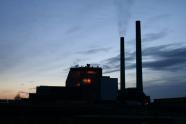Natural Gas Stature Undercut
Gas lobby fires back

Natural gas’ stature may get undercut. A new study says it is responsible for a lot more greenhouse gas emissions than either coal or oil.
The analysis by Cornell University says that the total greenhouse gases over 20 years as a result of exploring for shale are at least 20 percent greater -- possibly as much as double -- when compared to those of coal. That’s because natural gas is composed mostly of methane, which may have the ability to dissipate but is still capable of trapping more heat than carbon dioxide.
“The large greenhouse gas footprint of shale gas undercuts the logic of its use as a bridging fuel over coming decades, if the goal is to reduce global warming,” says Robert Horvath, a Cornell University ecology professor and lead author of the study. “We do not intend that our study be used to justify the continued use of either oil or coal, but rather to demonstrate that substituting shale gas for these other fossil fuels may not have the desired effect of mitigating climate warming.”
After the Japanese nuclear accident, the natural gas lobby has positioned itself as the wonder boy. But this most recent study cast a pall over that and all at a time when the U.S. Energy Information Administration is saying that natural gas will increase its market from roughly 20 percent today to 45 percent by 2035.
That’s largely attributable to the expected growth of the shale-gas sector. Those deposits are extracted by pumping a concoction of chemicals a mile underground to loosen the gas from the rocks where it is embedded. Critics, who have been arguing that such “fracking” is polluting the ground water, now have a powerful new point -- that the gas is not as pollution-friendly as its supporters have claimed.
The conventional wisdom is that natural gas releases about half the emissions as coal, and specifically carbon dioxide. The Cornell professor is casting doubt on that conclusion -- using research from the U.S. Environmental Protection Agency and the Council of Scientific Society Presidents. The former says leakage from distribution lines is more than previously thought while the latter warns that shale-gas may aggravate rather than mitigate global warming.
“Very little is known about the greenhouse gas footprint of unconventional gas,” writes Horvath.
Firing Back
The natural gas industry has been quick to fire back. One of its main contentions is that the Cornell study does not consider that methane emissions are also released during the production of coal. Energy InDepth goes on to say that the study’s assumptions are faulty and notes two shortcomings:
The first is that the 20-year time horizon it uses to make its calculations do not coincide with the more accepted 100-year time frame by scientists under the United Nation’s framework. The second one is that the estimated methane releases from shale exploration are vastly overstated -- 320 percent greater than what the UN’s scientists had assumed.
The reason that the shorter time frame used by Cornell’s ecologist is erroneous, the organization says, is because of methane’s ability to dissipate. After 100 years, the natural gas lobby says that the methane is “long gone.” Carbon dioxide, by comparison, is still around after 100 years.
Similar concerns are echoed by the environmental group Worldwatch Institute, which says that the same life cycle assessment is needed for both gas and coal. The group has previously said that natural gas can be an effective bridge fuel until green energy sources are full developed.
“The study’s conclusions rely almost entirely on the application of a Global Warming Potential factor that’s 45 percent higher for natural gas than the one cited by the UN’s Intergovernmental Panel on Climate Change (IPCC) in 2007,” says Energy InDepth.
The Cornell study is unlikely to derail the future of shale-gas. But it will give new ammo to its critics, who will use it bring about new rules to make the exploration process safer.
EnergyBiz Insider has been named Honorable Mention for Best Online Column by Media Industry News, MIN.
Follow Ken on www.twitter.com/freehand1200
energybizinsider@energycentral.com.
Copyright © 1996-2010 by CyberTech, Inc. All rights reserved.
To subscribe or visit go to: http://www.energycentral.com
To subscribe or visit go to: http://www.energybiz.com